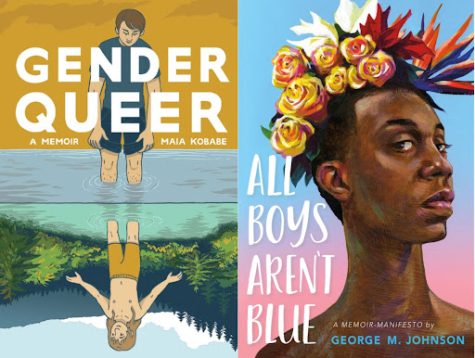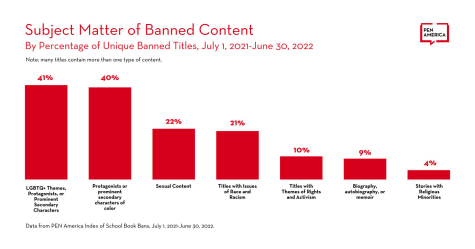Will District Keep Queer Books in Libraries After Parent Outrage?
March 23, 2023

In the past months, many Glenbard parents campaigned for Gender Queer: A Memoir and All Boys Aren’t Blue to be removed from school libraries for being inappropriate for students. This uproar is indicative of a broader trend where literature containing LGBTQ+ themes are being pulled from school library shelves across the country.
At previous school board meetings, several parents raised concerns over content in these books, which they consider objectionable. Some parents met with their respective building’s principal and librarians.
Glenbard West’s principal, Dr. Monaghan explained that “collectively based on those meetings, [all four Glenbard principals] decided at that particular stage to make a recommendation that these books not be taken out of circulation from the library.”
A few parents appealed that January decision, and following their policy(6:230-AP2), the district has formed an Ad Hoc Committee for Reconsidering Library Materials. It comprises all four Glenbard principals, librarians from each school, two district office members, and four community members from each building. The committee reviewed over 150 statements received from the community via a special email account to discern public opinion, and sources say that a majority favored keeping the books.
On March 8th, the committee met and invited eight parent complainants and allowed them 10 minutes each to express their concerns. They met again Tuesday the 21st to listen to presentations given by the school librarians and another from the Glenbard Attorney, Ms. Dana Crumley. During their final meeting in April, they will deliberate and recommend to the principals whether to retain these titles in school libraries. “Once the principals make the decision after the committee, then that’s the decision,” says Ms. Creech, the Executive Director for Teaching and Learning for District 87.
According to the American Library Association, Gender Queer by Maia Kobabe is the most banned book of the 2021-2022 school year, with All Boys Aren’t Blue by George M. Johnson ranked third. The top three challenged books all have LGBTQ+ identifying main characters and have been objected to for containing content considered too sexually explicit for students. At a November school board meeting, one Glenbard West parent declared ‘these kinds of books are not age appropriate for our kids, and they need to be removed.’ West’s gay-straight alliance club (also known as PRISM) issued a statement in support of the inclusion of these books in school libraries and argued that the removal “of these books is pure censorship and homophobia.” Dr. Monaghan states that to his knowledge, “we have never taken a book out of circulation in the library for an objection or reconsideration form” in his 28 years at West.
Glenbard West’s head librarian, Ms. Hollander explains that “books usually are challenged with the best intentions—to protect others, frequently underage people, from difficult ideas and information. In the particular case of these books, an often-cited concern is that they deal with issues of sexuality, gender, and sexual assault.” Under district policy (6.230) a request may be submitted by parents to the principal or school librarian for reconsideration of library materials.
Ms. Creech says, “on the form, it does ask them to have read the book because it is important to look at the book as a whole,” and by “just looking at one sentence, you miss all of that context of why something might have literary significance and be an important thing to have in a school library.”
Ms. Hollander invites students and parents who have concerns “to follow our library policies for requesting the reconsideration of a text, and the library is committed to listening to their perspectives before making a decision.”
Gender Queer is a graphic novel that focuses on the transgender experience and has garnered outrage for a depiction of oral sex and other images. West’s PRISM club points out that “this is one panel in the entire novel, and it’s within a context of a loving, monogamous relationship.” All Boys Aren’t Blue is a young adult memoir about growing up black and queer and has likewise received backlash for including descriptions of sexual encounters, as well as abuse, racial slurs, and profanity. A Glenbard East parent said, “the graphic sexual language that is in these books, that’s not diversity; it’s pornography. It does not belong in our schools.”
Books have been banned for as long as literature has existed. The Great Gatsby, To Kill a Mockingbird, Catcher in the Rye, and Of Mice and Men are all considered American classics and are currently required or optional reading for English classes at West. They have also been banned in several American schools over the past decades. Catcher in the Rye by J.D Salinger is required reading in AP Language and Composition, and has been banned in various districts from 1960 to 2009 for being considered sexually explicit, containing offensive language, and being generally “immoral.” Of Mice and Men by John Steinback is a required read for English 2H students and has been a target of censors since 1977 for containing profanity, racial slurs, and some lewd sexual references.

In recent years, books containing LGBTQ+ themes have become a major target of censorship, with 41% of banned titles of the 2021-2022 school year containing queer themes or main characters, according to PEN America. Mme. Callicoat, who co-sponsors the PRISM club, feels that “this is a very sad trend because you don’t have to take the book out if it’s not something that interests you.”
Ms. Hollander says the role of a school library is not “to censor books, but rather to curate them. The library has the responsibility of selecting the best materials possible for our student body: we have to find titles that offer literary value and a wide range of perspectives. “When purchasing books for the library, I consider that the content in the text should be interesting to our students, age-appropriate for people 14-18 years old, and a reflection of our diverse student population.”
Mme. Callicoat adds that “the LGBTQ community is a marginalized community who has to fight for who they are and their identities.” In order “to find role models, a lot of students in the community turn to books.” A Glenbard South parent agrees “that we need to create a respectful learning environment that represents all of our community, all of our students, and all the diversity. I don’t think there is a place for pornography for that.”
In their statement, PRISM expresses that “removing these books excludes our stories and makes us feel unseen. […]We want to feel seen. Literature is [a] key resource for us. Please don’t take it away.” Vocal parents continue to demand action from the district because a “child cannot unsee what they have already seen. They cannot un-read what they have already read. So please save us and save our children,” pleaded one parent of two West students.
Dr. Monaghan thinks that “it’s important for libraries to represent our student body” and “we need to be open-minded. We need to have spaces for students who not only come from very traditional backgrounds, that might be religious, as well as the students who might identify in different ways that would be considered much more progressive.” He goes on to clarify that “with families that represent both sides, I am in support of their students, however I can be. I’m in support of their students, and my charge as principal is to create an environment that is welcoming for all those families and their students.”
The district Ad Hoc Committee will meet again in April to develop a final recommendation for Glenbard principals. Until then, Gender Queer and All Boys Aren’t Blue will remain on school library shelves.